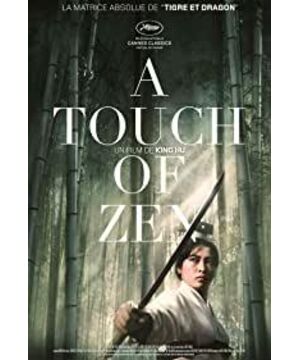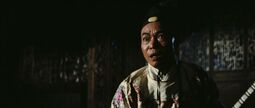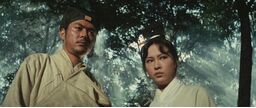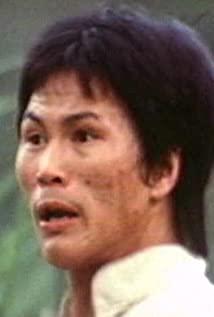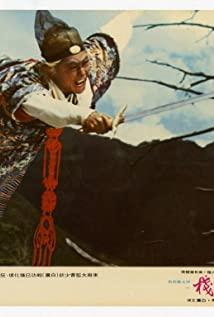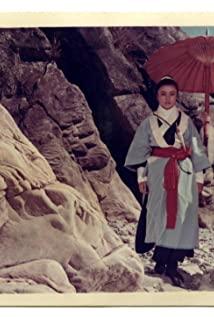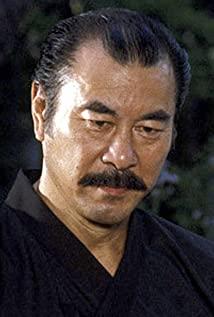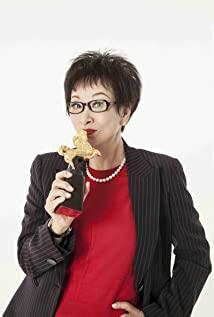If someone were to ask me about my favorite Chinese martial arts movies, even removing the word "Martial Arts" and choosing one of my favorite films in the history of Chinese movies, I would definitely tell him without hesitation that it was from Hu Jinquan. "The Heroine".
If you can only watch one martial arts movie, or even one movie that best represents China, then don't hesitate to watch "Chivalrous Girl".
As long as there is such a movie, Chinese martial arts movies have a firm foothold in the history of world movies. On the contrary, no matter how prosperous the martial arts movies have been in the future, if there is no "Xia Nv", it is like the crown is missing the biggest jewel, and everything will be overshadowed.
Hu Jinquan has always been known as China's Akira Kurosawa. This description is not so much to praise Hu Jinquan's style as Kurosawa Akira. Or, it means that Hu Jinquan's status in the history of world cinema is close to that of Kurosawa Akira. Rather, Hu Jinquan is to China what Kurosawa is to Japan. The two of them have almost worked together to open up the possible realm of expressing their own national culture in the film, transforming the most subtle, indescribable, unique and richest beauty and artistic conception in a culture into eternity on the big screen. image. Moreover, the most rare thing is that this conversion has been recognized by the world. In other words, they not only grasped the core part of the local culture, but also let this part really affect the world.
It was from Hu Jinquan that Chinese directors began to create their own world, whether Hou Hsiao-hsien, Yang Dechang, Tsai Ming-liang, Tsui Hark, Wong Kar-wai, or even Ang Lee, none of them have entered the world-class director rankings. Not affected by Hu Jinquan. (Please don’t mention the third and fourth generation directors in mainland China, their influence and world status have been declining in recent years. Now, the only person who still maintains his reputation is about Jia Zhangke - what I said is just a fact That's it.) Can you imagine Chinese novels without A Dream of Red Mansions? You can't imagine that there is no Hu Jinquan in Chinese movies.
The one that best represents Hu Jinquan's personal style and has won him the most praise and prestige is, of course, "Chivalrous Girl".
The story of "The Heroine" is really simple.
(I'm going to spoil it, but "Chivalrous Girl" belongs to the kind of movie that even if it is completely spoiled, you can watch it a dozen times again.)
Although it is adapted from Pu Songling's "Strange Tales from a Liaozhai", the scholar in the original work is too vulgar, not only poor but also lustful, and the chivalrous woman in the story is too inexplicable and emotionless. And Hu Jinquan is obviously not interested in such a story, but in this story, the love and hate that is rarely dominated by women obviously affects some of his thoughts.
So in his film, the story was modified as follows:
A poor diaosi who is unwilling to be lonely meets the former Bai Fumei who has undergone a big change in life. Just like in life, Jiao Da also likes Sister Lin. In order to catch a horse, he uses a tracking trick. Moved by his mother and wanting to save a later consideration for himself, he agreed to become the poor diaosi's friend. Unexpectedly, the poor diaosi also has hidden skills to help the girl deal with the enemy. Originally thought that by carrying out the revolution with his head, he would be able to get Bai Fumei to agree with him, but Bai Fumei mysteriously disappeared. The poor diaosi relentlessly searched for Bai Fumei, but Bai Fumei finally became a monk, leaving only the crystallization of a one-night stand - a fat boy.
(I really tried my best to make it interesting and simple, woohoo…)
Just such a rotten stalk, it was photographed by Hu Jinquan to be extremely poetic, extremely gentle, extremely profound, extremely tragic, and of course, extreme, exclusive to traditional artistic conception, indescribable beauty.
If I had to describe it, I can only say that this movie has the ultimate Chinese flavor.
Moreover, none of today's movies can be compared with it. The core of "Xia Nv" is purely Chinese - or, in other words, the way of thinking of all the characters is so traditional that no one will make people feel inconsistent, out of that era.
Let's talk about poor diaosi scholars first.
Gu Xingzhai, a scholar who lives in seclusion with his old mother in a small remote county, usually sells calligraphy and paintings for a living. Although he is so poor that he can't even marry a wife, he likes reading and entertaining himself, and he has a unique "energy" in his heart. ” This energy made him not interested in being an official, but at the same time he also had the pursuit of realizing his personal ambitions without wasting his life.
Gu Xingzhai, of course, has the shadow of a Confucianist. "Gou Quan lived in troubled times, and did not seek information from the princes." Although he has never expressed his dissatisfaction or even hatred for the social and political environment, he did not want to contaminate the officialdom at all. Poverty mentality, you can see its self-righteous personality. It was this kind of personality that made him fall in love with Yang Huizhen, the young lady of the Huanmen at first sight—there is no doubt that the scholar-in-law, the lady after Zhongliang, naturally has a temperament that a girl in a remote and isolated small county does not have, and this temperament is the "eye". The shadow of the ideal world that Gu Xingzhai longed for in his heart. Therefore, he was told by his mother all day long that he would not marry a wife in his 30s. Sooner or later, he would become an old man, and he had to carry out the "leftover man" to the end. He didn't say a word, and only saw that Yang Huizhen was his "destiny". people", secretly liking his mother's proposal to propose a marriage, and often secretly observe each other's every move after being rejected, which is in stark contrast to his previous disapproval of married women, and even more so when he was willing to risk his life to help Yang Huizhen, and kept pursuing it. She set the stage.
How Gu Xingzhai's feelings for Yang Huizhen happened, Hu Jinquan laid the groundwork for more than half an hour. There is not a single direct line, but through the eyes of Shi Jun, who plays Gu Xingzhai, a turn of eyes, a gossip, let everything happen in the unique Chinese style of subtlety, restraint and deep silence. In today's Chinese film and television dramas, we can hardly see such emotional expression - just borrowing ancient props and sets (even this is a mess), and starting nondescript embarrassing performances seems to be today. the mainstream.
Although the emotion is far from the theme of "The Heroine", this emotion has aroused a certain emotion in my heart: so slow, so quiet, so calm - even a one-night stand can be so poetic and yet Aesthetic, because the characters quietly form a huge inner tension in this slow, quiet, calm, so that people can feel so empathetic, right? So slow and so beautiful!
Let's talk about the chivalrous girl Yang Huizhen.
Xu Feng, the actor of Yang Huizhen, can be said to be a classical beauty in terms of her appearance, with a standard duck face and almond-like eyes, but this classic lacks the weakness and morbidity of traditional ladies. Like Zheng Peipei, Xu Feng's beauty Has a hidden edge. Even with a paralyzed face to the end, you have to admit that she has her own radiance. Moreover, while his words and deeds are calm, he also does not lose the lingering and coldness of a chivalrous woman.
Compared with Gu Xingzhai, she is more mysterious, more restrained, and more difficult to get close to. Although she is an absolute female protagonist, there is always a fog surrounding her, which is awe-inspiring and perhaps incomprehensible.
The chivalrous woman in the original work of "Liao Zhai" is actually far more boring than Yang Huizhen. Even when she knew that the other party was being rude, she still promised her (of course, the purpose of repaying her kindness and staying behind was stronger). It can be said that she It's just a symbol. In a patriarchal society like the Qing Dynasty, where women are extremely degrading, Pu Songling's chivalrous women focus on men's alternative fear and worship of women - this woman is so powerful that only grace and hatred, love and affection, and weakness And rely on, all thrown into the pile of paper. Such a woman cannot be trusted.
But Yang Huizhen undoubtedly represents Hu Jinquan's longing for traditional women: affection, righteousness, discipline, and restraint. In her emotional world, Gu Xingzhai is probably just a passerby and a supporting role, maybe she can get an unintentional glimpse of her, but that's all. As she sang among the haunted ruins:
Intercourse when awake, and disperse when drunk. Eternal knot ruthless travel, looking forward to Miao Yunhan. ...
Does Yang Huizhen love Gu Xingzhai? This question doesn't seem to make sense. For her who has experienced family ruin, as a fugitive, lonely and helpless, there is no tomorrow for today, the emotions and ties with anyone are unbearable weight, which is the so-called "bad fate".
But as a woman, or in other words, as a human being, how can you not have a slight affection for a certain opposite sex?
When Yang Huizhen leaned on Gu Xingzhai, she didn't want to find someone to rely on, but just "accompany the moon and the shadows for a while, and enjoy the spring." For this long escape, she just found a little solace - of course, more grateful (Gu Xingzhai’s mother’s care for her has been weakened, but Miss Yang seems to be moved by her sincere marriage proposal), sealing up (not wanting Gu Xingzhai, who is about to discover her identity, to leak the secret), and The purpose of staying behind (both parents have died, and he is not allowed to live in the world).
However, after all, Hu Jinquan still left a gap, that is, in the early morning when they had sex all night, Miss Yang, who was the first to wake up, used the weed growing in the dilapidated house to block Gu Xingzhai who was sleeping. The morning light in the house did not disturb his sleep.
Therefore, this "evil fate" in Yang Huizhen's mouth, this only one night, was photographed with infinite poetry and infinite sadness. The moonlight, the flowers, the night, and the sound of the piano also revealed the infinite desolation of life.
——Obviously, Yang Huizhen, who is a girl, is still moved, even if it is a little bit. So unavoidable, so fleeting.
The note she left to her companions said that Gu Xingzhai was not an ordinary person. She knew that he was observing herself, and she probably admired how someone could have such insight in this remote mountain. She also knew that he refused to go to work and was willing to be poor. Perhaps, she knew that the officialdom was dark and her parents died because of this, and she also had a deeper recognition and admiration for his choice. Seeing that the talented and savvy person sinks into the countryside, or she also has the same sympathy and pity for the fallen people in the world. A specific situation has narrowed the distance between these two characters who were originally worlds apart.
But in the gap between life and death, she didn't dare to love, she couldn't love, she was a lady, how could she look down on this poor-looking rural scholar? The best part about Hu Jinquan's grasp of this emotion is that even though the distance between the two of them is 108,000 miles, in the end, she can't help but give a little bit, even if it's really only a little bit.
Just a little bit of it is enough to make people feel irritated. Now the screen is full of life and death, earth-shattering, you are the wind, I am the sand... But how many times have you fallen in love, can you match the mottled little love that seems to pass through the gap of fate?
She didn't expect this man to help her and take responsibility. She didn't dare to expect anything, she just hoped that she wouldn't implicate him.
Of course, there are multiple motives for Gu Xingzhai to help Yang Huizhen. This is the difference between a good movie and a bad movie. The characters in a good movie are always complex. Why they do it can only be understood.
First of all, Gu Xingzhai was a Confucian scholar. He did not understand right and wrong. He undoubtedly sympathized and agreed with Yang Huizhen's father. Secondly, his feelings for Miss Yang are far more hot than the other person's feelings for him. To Gu Xingzhai, Yang Huizhen is not a woman who has inherited the lineage, but a symbol of another world in which his sensitive heart has always existed but cannot be revealed and no one understands. In that world, he can realize the value of his life, get recognition for his talent, get dignity and love. If a man ignites such feelings for a woman, it is often extremely warm and long-lasting.
In the end, it is the ideal that every Chinese-style intellectual has: "To be successful and to help the world." He said that he is familiar with military books. Think about it, if he makes a living by painting, his life goal is to be a poor and rotten scholar who is a teacher. , What is the purpose of being familiar with military books?
When he successfully designed Yang Huizhen to have fewer enemies and more enemies and annihilated the Dongchang Fanzi who came to clean up, Hu Jinquan presented the most uncomfortable and exciting scene in his entire movie:
Gu Xingzhai held a feather fan in his hand and wore a scarf on his head, dressed like Zhuge Liang on the stage, looking at the tired corpses, laughing wildly all the way, laughing back and forth. That laughter, indescribably proud, conceited, cheerful, and even creepy.
Is he finally out of the pretentious, but trapped in the lower layers, the wickedness of the half-life? Or did he boast of Kongming and finally proved his pride? Finally, he is no longer a despondent and frustrated person who has fallen into disrepair and no one understands. He used the blood and life of others to find his own sense of existence.
With a sympathetic, detached, and even ironic gaze, Hu Jinquan looked at Gu Xingzhai in his own movie, and looked at all the ordinary beings in Chinese Confucian culture (perhaps, it is more appropriate to say that he is a scholar or an intellectual.)
When Gu Xingzhai put incense on Yang Lian, kicked several corpses with one foot, and kicked down the county magistrate's corpse in a panic, he realized that Yang Huizhen was gone, and at this time, he really felt scared. I felt the fear of death, the fear of the future, the fear of committing murder by myself.
So, he stumbled, disheartened, and crawled out of Jingtun Castle, but what he met was a group of monks who buried their bodies in silence. He grabbed these monks as if he had grabbed a life-saving straw, and he asked everyone, "Miss Yang, Miss Yang?" The pattern of this man was exposed here.
Those strategies he came up with were actually completely unremarkable, at best the level of the countryman, Liangshan Wu Yong. It can only be said that at the time, he could still exert his power for a while, but even this made the scholar feel the meaning of his existence, but this so-called meaning of existence made him seem so wretched, so vulgar, so Stupid, so pathetic.
(Hu Jinquan found Shi Jun, a typical technical nerd who was a researcher. He did not say that he had a classical literati temperament, but even coaxed him into an actor. I really don’t see where Shi Jun has a classical literati temperament, because he really said no. What comes out is dark, sinister and wretched, I can only explain that the traditional literati in Hu Dao's heart is like this. It is undeniable that Shi Jun's acting skills are very good, but it is always somewhat inconsistent with the elegance and books we imagine today. Version, even at the time, had nothing to do with appearance.)
His world, after all, is only so big, and the soil on which he lives is too barren, no matter how talented he is, it is impossible to give him enough energy to make him mentally sound, strong in heart, and wise. People (only a little clever). Here Hu Jinquan seems to have stabbed the Confucian scholar again. But this reflective knife must also need to be answered by himself: Where is the road?
A wisp of Zen.
The first half of "Chivalrous Girl", although not outstanding at the box office, has an excellent reputation. When it comes to the second half, it can be said to have completely collapsed. To this day, there are still many opinions and controversy.
As a non-Buddhist, I don't want to comment on this second half at all, and I don't necessarily agree with it much, but because of this second half, I have full respect for Hu Jinquan, and I can say that he is a real world-class director.
Huiyuan, the ideal character created by Hu Jinquan, bleeds golden blood, bears the radiant red sun, and sublimates everyone with his death, even the worst leader of Dongchang, the devil who kills without blinking an eye. Let everyone kneel at his feet, and let go of killing and hatred under the inspiration of his supreme spirit...
What Hu Jinquan wanted to say finally came out. In all the previous movies, he failed to say it.
Perhaps the biggest difference between a world-class director and ordinary directors is that he must have world-class ambitions.
As a human being, the greatest ambition is to find the highest spiritual realm and the metaphysical meaning of life.
What can be used to get rid of human nature itself, or in other words, to cleanse the darkness of Chinese culture that is full of blood, killing and selfish desires?
Huiyuan has already become flesh and used his death to redeem everything.
This is the ray of Zen machine that Hu Jinquan was looking for, right?
Unspeakable, unspeakable.
You can feel it.
In fact, Hu Jinquan's ending is really unfortunate and easy to collapse.
He Ping of "Heroes of Heaven and Earth" especially wanted to worship Director Hu, but he just didn't have the strength, and finally broke the film well.
Whether you really have faith or not, you really have to pull it out for a walk to find out.
Based on this point alone, what do you think of future directors in China compared to Hu Jinquan?
This film, most praised by later generations, is Hu Jinquan's unique lens language, which is his picturesque, poetic and leisurely unfolding lens like a landscape painting.
For a movie, it took more than 20 minutes of scenery at the beginning, pure scenery, my god forehead...
In Hu Jinquan's films, fog is the most important element in the background elements of the picture. Fog is both a barrier and a curtain. Envelop the space in the film in its specific atmosphere. More often, fog is also a purely aesthetic need, smearing out the ancient beauty of the film, resulting in blank space in the picture, and the mysterious realm of the martial arts world is expressed in the picture. Pavilions, balustrades, and curtains also often appear in Hu Jinquan's martial arts films.
Light is another "separation" in Hu Jinquan's martial arts films. (In the last battle in the desert in "The Heroine", the desert is empty and desolate, a red sun hangs high, Huiyuan slowly walks to the top of the mountain, and sits quietly under the sun , the sun formed a circle of light of the Buddha statue behind him, and the halo diffused in the picture, blurring Huiyuan's face. The light constituted a symbol and a curtain, which brought out the solemn meaning of the treasured image. , the battle has entered another level, transcending the level of martial arts and the changes in moves, and entering the spiritual level, so the lofty Zen will naturally be conveyed to everyone.
The film also uses a lot of long shots, a character slowly passing through the camera, a cloud, a dihua and a moon... Like the most traditional Chinese landscape painting, it unfolds slowly, leaving only infinite blank space and poetry. For example, in the film Ouyang Nian sees General Shi in the rain, the color tone of the picture is old and dull, the autumn rain is continuous, and Ouyang Quan is wearing a bamboo hat and holding an umbrella, which is completely the artistic conception of Chinese painting. The scene where the chivalrous girl and the spy from Dongchang are in a decisive battle in the bamboo forest, the sunlight penetrates the fog and the bamboo forest, is ethereal, reminiscent of the poetry of Wang Weichan's poems, as if "returning to the deep forest, re-illuminating the moss". This classic scene was used by later director Ang Lee in the scene of the fight between Li Mubai and Yu Jiaolong in the bamboo forest in "Crouching Tiger, Hidden Dragon".
The film's soundtrack also uses traditional musical instruments, such as guzheng, guqin, flute... Unlike Akira Kurosawa who uses a lot of western musical instruments, Hu Jinquan has a deeper experience and emotion for opera and classical instruments, so in his films, these instruments seem to give With different characters and different situations with different personalities and emotions, he really used the single-line national musical instruments that have always been considered to be not full enough to interpret the unspeakable complexity, giving the film more classical atmosphere.
Judging from his life and resume, Hu Jinquan, who was born in a scholarly family, has a classical cultural quality that is difficult to reach by today's directors. Most of Gu Xingzhai's calligraphy and paintings in "Chivalrous Girl" are from his own hands. He has a more natural love for classical opera, and these have turned into the space and space in his films, the space and time where Dao gathers emptiness, and the realm of transcendence and emptiness. Hu Jinquan's aesthetic contribution to Chinese directors is enormous. In this regard, he is almost a pioneer.
Hu Jinquan is the first Chinese director to win a world-class award, and it is he who single-handedly proves that traditional Chinese culture can be combined with "modern" products such as light, film and film, which means that traditional culture can still exist. The value and possibility of going down. This is exactly where Hu Jinquan can compare with Akira Kurosawa.
But compared to Akira Kurosawa's prolific and diverse, there is no doubt that Hu Jinquan's position in the world film history is much bleak. environment and times.
Although it was also facing the dilemma of traditional culture, Japan at that time, after all, was more diverse than China at that time, and it could accommodate more people. Moreover, his efforts were also responded by many other creators. , Before and after him, someone took the initiative to pave the way for him, took the initiative to learn from him, and moved forward in the direction he created. On the contrary, whether it is Hong Kong or Taiwan, Hu Jinquan's "box office poison" is really not sympathetic. Although he has gained a very high world reputation, it is really difficult to survive in the highly commercialized Hong Kong. At that time, Taiwan could not tolerate the attachment to the mainland revealed in Hu Jinquan's films, as well as the various ideologies that strayed from the side. Hu Jinquan wanted to go back to the mainland to make movies several times in his life, but he was rejected by the mainland because of the relationship between the two sides of the Taiwan Strait.
The most important thing is that although Hu Jinquan has repeatedly shown himself as a Confucian scholar, his worldview does not conform to the mainstream of Confucianism. The metaphysical and ultimate meaning of life he was looking for was not the Confucian "benevolent love of others", but the supreme Nirvana in Buddhism, and the blissful state of no desire and no sorrow. Through Hu Jinquan's hands, all disputes are elevated to philosophical interpretations. In Zen philosophy, all these are meaningless, so any struggles are invisible, and any whirlpools of emotion and power have lost their support - so Hu Jinquan will always be It is impossible to be as hot and sincere as Akira Kurosawa. He always maintains the same sense of alienation from the present life as in his movies, which is always foggy and rainy. This is indeed a bit arrogant to ordinary people, as well as people from other cultures.
(However, this may also remind us that the thinking about the ultimate meaning of life in traditional culture is missing. A culture like ours cannot nourish a truly influential world-class national elite?)
But that inexplicable ray of Zen is just a ray of light that can illuminate people's hearts. It's just that it is the last flashback, or the future with infinite meaning. Today, when martial arts movies are declining, or the influence of Chinese culture in general is declining, I can't come to a conclusion.
Just leave time to answer.
View more about A Touch of Zen reviews


